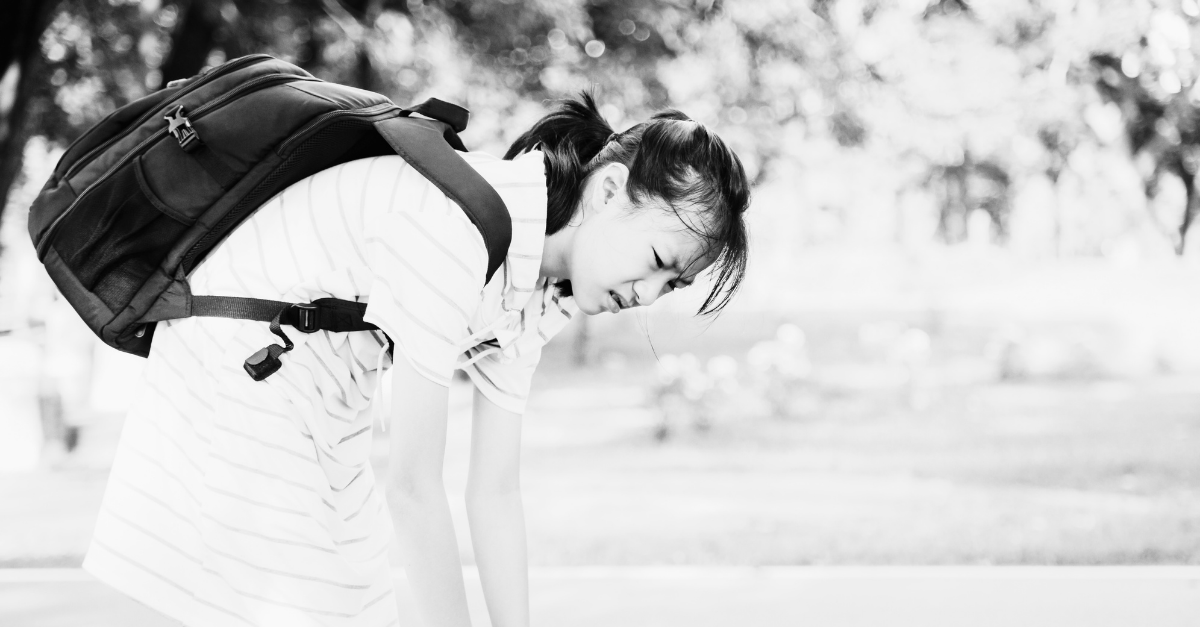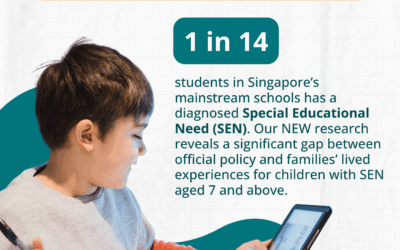If you’ve only got a minute:
- EveryChild.SG interviewed 15 Singapore-based child psychologists and psychiatrists for a report on the potential link between academic stress during primary school and poor mental health among young Singaporeans.
- We found that Singaporean children receiving mental health services experience academic stress at roughly twice the rate of their expat counterparts.
- Experts emphasized that levels of academic stress seen locally are developmentally inappropriate and can serve a trigger for things like self-harm, low self-esteem, and harsh physical punishment.
- Children’s social, physical, and mental health needs are being deprioritized in the pursuit of academic excellence – with serious, long-term mental health costs that, experts warned, can last into adulthood.
Singapore is unique among developed countries in the amount of stress it places upon its primary schoolers. The PSLE, at age 12, subjects children to high-stakes, “do-or-die” academic pressure at a much younger age than in Europe, North America, or even other developed Asian countries, where the first high-stakes exam typically occurs at age 15-18.
What is the impact on our children? Studies from across Asia conclude that academic stress during primary school contributes to poor mental health outcomes for children, but there is surprisingly little research about this locally.
So EveryChild.SG interviewed 15 Singapore-based child psychologists and psychiatrists for a report on the potential link between academic stress during primary school and poor mental health among young Singaporeans.
What we found was this: Singapore’s system is not neutral in its mental health effects.
One crude, but telling, gauge of this is the frequency with which children reference academic pressure as a source of distress during mental health visits. Our interviewees shared that about 50%-70% of their local clients reference academic pressure as a significant source of stress, compared to only about 25%-30% of their expat clients.
In other words, the estimated prevalence of what we might informally term ‘problematic’ academic stress among Singaporean children receiving mental health services is roughly twice that of their expat counterparts.
In addition, practitioners noted that stress peaks for expat children much later, at around age 16-18, vs. age 10-12 for local children preparing for PSLE. These differences matter.
Children In Distress
Over the course of our interviews, we heard numerous stories about children who are in deep mental anguish.
Whether it’s the 8-year-old biting his fingernails bloody to cope with falling behind on homework, or the 10-year-old who took to cutting herself because she was consistently denied opportunities for rest and play – our interviews painted a grim picture of Singaporean childhood.
Certainly, mental health issues are complex, and none of the psychologists we interviewed denied that genetic, relational, and other factors were also at play. Yet academic stress was consistently cited as a significant environmental factor that contributed to their young clients’ mental health problems.
“If I look back at most of my local school clients who come to me, even if they’ve come to me for any other reason, maybe it’s peer pressure or bullying or relationship or a parental issue, there is always this huge emphasis on academic pressure. So it’s always present. It’s never not present.”
Psychologists cited a range of ways that academic stress can manifest, including anxiety, school refusal, low self-esteem, and in some cases, self-harm. Many noted that these issues start young – around the time that children begin preparing for PSLE – and some noted that their calls spike each year around exam time. Each of these manifestations is intensely distressing for parents – and for children.
Chronic Stress; Societal Effects
Psychologists emphasized that the narrative of PSLE as a do-or-die, life-path-determining exam – which is pushed by society at large, as well as some teachers and parents – creates a state of long-term, or chronic stress in many children that is not developmentally appropriate, and that may continue to contribute to poor mental health well into adulthood.
[Is PSLE ramp-up pressure developmentally appropriate?] “For sure, no.”
“No. That kind of stress is not good for anyone. I don’t care if you’re 12 or 20 or 40.”
To be clear, this is not the kind of stress that builds resilience. This is the kind of stress that only wears people down.
Many of the Singaporean psychologists we interviewed that are Gen X or older noted that the perception of PSLE as a do-or-die exam, as well as the actual content knowledge required to do well, both appear to have significantly intensified from “their time” – meaning that today’s children are not necessarily experiencing the same PSLE that their parents and (possibly) grandparents emerged from “unscathed.”
Further, the intense focus on sorting children during their early years – when their moral values and life outlook are still being formed – appears to have contributed to self-imposed pressure in some children.
One psychologist told of a 12-year-old client from a well-to-do family who was experiencing intense anxiety about PSLE; the girl matter-of-factly shared that she felt pressure to score an AL1 “or I will be poor.” Another psychologist notes:
“I had a very honest client who said to me: ‘I have an elitist mindset. I need to be in the top school. I need to be the best to feel good about myself.’ The kids are more honest than the parents most times [laughs].”
No wonder that even some Singaporean adults are still grappling with mental health issues related to their primary school years.
One psychologist spoke of adult patients who still feel that their PSLE score “sticks to them”; even as adults, they continue to judge themselves by it, and use it to assess their ‘place’ in the social hierarchy relative to others. He says:
“This [mode of thinking] has huge psychological impacts; it prevents people from developing a growth-based mindset, which is what therapy advocates for.”
A different psychologist concurred, reporting:
“I know [adult] clients of mine who said that they feel like their PSLE numbers are hanging around their necks. Yeah, no, they are defined by what they did at PSLE. They’ll never forget.”
Stressed Families; Strained Relationships
The study identifies three key sources of stress: parental expectations, school-driven exam culture, and children’s internalised fears about failure. We found that PSLE stress, which affects parents as well as children, can have a particularly insidious effect on the parent-child relationship, weakening familial bonds and further contributing to mental health issues among children.
“Academic stress is one of the triggers to things like harsh physical punishment. So a lot of times, parents get anxious and they get frustrated, and many of them will resort [to harsh physical punishment].”
“I have probably a dozen or so [cases of parents & children working through damaged relationships due to academics] in the last few years. Not that the relationship isn’t repairable, but the parents do kind of go overboard, and afterwards, like in hindsight, they go, ‘Oh, wow. I think I really did some pretty negative things to my child because we were so stressed about PSLE.’”
Even in less extreme situations, interviewees noted that academic stress can still weaken the parent-child bond when academic performance becomes the primary topic of conversation at home. Instead of nurturing and supporting their child’s emotional development and identity exploration during the challenging “tween” years, some parents feel they must take on the role of task-masters. While often done with the child’s best interests in mind, interviewees indicated that this can still be experienced by children as a loss: “My parents were lovely people. What happened to them? … It’s too early, at that age, to be going through this.”
Many parents feel trapped in a prisoner’s dilemma, unable to make the choice not to compete. Parents do not operate in a vacuum; they are often keenly attuned to the values, expectations, and reward structure of the society around them. Many parents push their children academically during primary school, not out of any particularly kiasu / competitive spirit, but because they genuinely believe they are doing what is best for their child’s future wellbeing in a system where children are stack ranked and assigned to different schools, with different long-term financial prospects, based on their PSLE results. What could parenting look like if the PSLE pressure-point was removed?
PSLE and the Loss of Childhood and Play
As noted above, from a mental health perspective, the professionals we interviewed for this report were concerned with PSLE’s tendency to dominate Singaporean childhoods, sometimes as early as P1.
Almost without exception, the mental health professionals we interviewed expressed concern about the amount of tuition that their primary school-aged clients were enrolled in. Critically, practitioners’ concerns were not related to the quality, or type, of tuition that children were receiving, nor even to negative or stressful experiences that clients may have had at tuition centers. Rather, the sheer amount of time spent in tuition was, in itself, enough to raise concerns for these mental health practitioners.
In his popular book, The Anxious Generation, Jonathan Haidt describes smartphones as “experience blockers”: by monopolizing children’s free time, smartphones prevent children from engaging in the diverse real-world experiences that are necessary for their development into healthy, resilient, fully-formed adults (Haidt, 2024). We think it is fair to ask if excessive tuition could also be characterized as an ‘experience blocker’ in the Singapore context, by significantly reducing the unstructured, exploratory time that is necessary for their growth.
“I think we need to be asking ourselves: How many opportunities do young people actually have to connect with other humans? Because they’re spending so much time in structured activities, be it tuition, I mean, the window of freedom has got so small that I think that’s more my question to parents is, how much freedom do you give your child to go out and roam the streets, and ride a bike and hang out with friends? The problem is that their window is very small because they have so much to do.”
Too often, children’s social, physical, and mental health needs are being deprioritized in the pursuit of academic excellence. In their eagerness to help children succeed, adults may – perhaps without fully realizing it – be signaling to children that the child’s own individual interests, mental health, and developmentally-appropriate needs for play and rest, are less important than their ability to meet adult expectations. Even the simple act of increasing tuition and decreasing leisure time can send a powerful message to children about what the adults around them truly value.
It’s good for children to learn discipline and focus. But teaching them to consistently say “no” to their developmentally-appropriate needs – to grind away at a more exhausting schedule than most adults, in the fear of being shamed or even punished for perceived academic failures – is not that. And it has profound implications for their mental health, both during childhood and over the long term.
Reimagining Primary Education to Prioritise Children’s Mental Wellbeing
EveryChild.SG’s 10-Year Plan to Transform Primary Education proposes concrete changes that will reduce unnecessary competition and prioritise the mental health of every primary school student.
As parents, educators, and policymakers, we are all stewards of Singapore’s only “natural resource”: its people. There is little benefit to the nation in pushing academic achievement at the expense of future adult citizens’ mental health.
“I guess in every system there will be children who do well and children who don’t… But what’s the cost to themselves, to their families, to the parent/child relationship, to their own mental health to get there?”
With a declining birthrate and a shrinking native-born population, it is in Singapore’s long-term economic interest to ensure that every child is nurtured to be mentally strong. The evidence is clear that academic stress during primary school is not conducive to this.
Read the full report: Academic Stress Among Primary Schoolers in Singapore: Investigating the mental health impact of a childhood defined by PSLE




